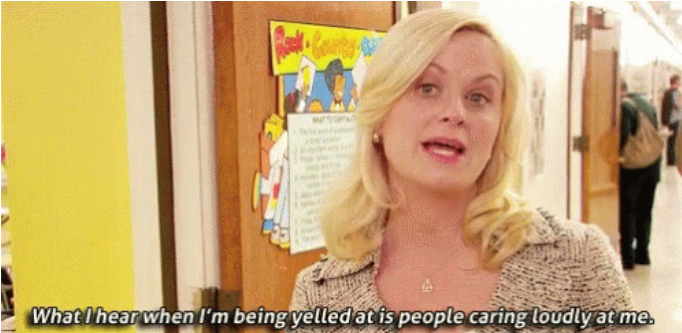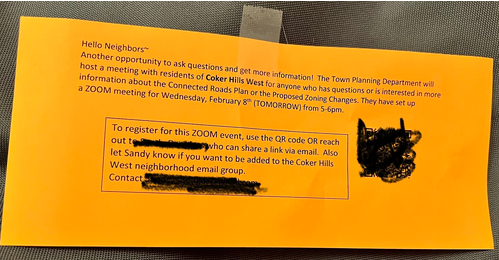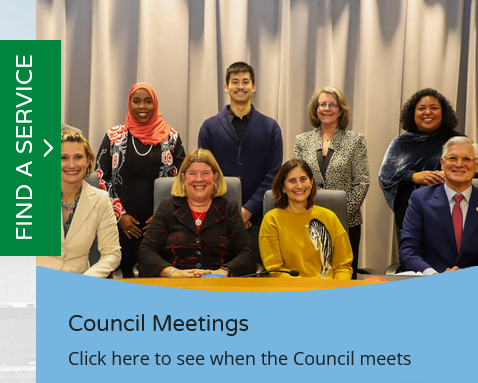In the 2019 book “Neighborhood Defenders,” Boston University researchers Katherine Einstein, David Glick, and Maxwell Palmer trace how “land use institutions ostensibly designed to empower underrepresented neighborhood groups actually amplify the power of neighborhood defenders to stop and delay the construction of new housing.”
The authors define neighborhood defenders as homeowners who oppose new housing projects. Their opposition is far stronger than than the broader community’s support, and the homeowners are much more likely to be privileged due to wealth or other factors.
We’re experiencing that here in Chapel Hill and Carrboro, with fierce criticism being leveled at the Town Council members who are considering a proposal to enable more housing options throughout the town. (To see some of this, start with our live blog of the January 25th council meeting.)
In the face of consistent criticism from Chapel Hill’s neighborhood defenders who are trying to preserve our system of exclusionary housing, nearly all of our Town Council members deserve our high praise for staying the course and trying to do what’s right for the town, its citizens — all of its citizens — and its future.
The loudest voices in the room
The sort of opposition that Einstein and colleagues discuss doesn’t just play out in housing projects — across the country, neighborhood defenders have tried to scuttle community centers, greenways, playgrounds and other amenities that help strengthen community and provide spaces for people of all ages. The projects have one thing in common: they’re located near the homeowners opposing them.
Here in Chapel Hill and Carrboro, we’re not immune to this dynamic.
We’ve seen it play out with Carrboro’s proposed paved path along the Bolin Creek Greenway, where a small band of opponents whose homes border the creek have effectively blocked a project that the larger community has said — through surveys, through charettes, through community engagement — that we desperately want so that everyone in Carrboro can access a safe, paved greenway to make it easier to get to school and places of interest in Chapel Hill.
We’ve seen it in public comments in Chapel Hill over the recent “Connected Communities” proposal to establish a policy in favor of connecting our neighborhoods with streets, many of which were kept disconnected for no good reason. It’s a pretty popular concept in the abstract: neighborhoods should have different entrances and exits so that vehicles travel fewer miles, more kids can walk to school safely, and residents have alternative paths to travel when road maintenance is done.
But the person who lives next to the proposed greenway or end of a road is going to oppose the proposal loudly and take the time to write in and rally the neighbors with more fervor. Their voices will far outnumber the majority of residents who are supportive, but who won’t bother to get involved.

And we see that with the housing choices proposal in Chapel Hill which has been dominating the news. Almost everyone agrees that there is a housing crisis, and the lack of safe, affordable, and attainable housing is obvious in a place like Chapel Hill. While the problem is multifaceted, a big element is that so much of our town only allows single-family homes to be built. It’s a legacy that dates back to segregation. The intent then was to exclude certain types of people from the neighborhood. The intent may be different now, but the impact is the same — and it has been very effective, as the Biden Administration recently pointed out.
As a first step to end this legacy of exclusionary zoning, Chapel Hill Town Council is considering a proposal to liberalize the town’s zoning regulations to allow a property owner to build two-, three-, or four-family homes. This is not a government mandate, and it won’t force anyone to sell their home. To us, as we have written before several times, it’s a common-sense approach to allow more people the opportunity to live in our great town.
But for many who live in their exclusive neighborhoods, it is a threat. And they are making themselves heard, in neighborhood meetings that council members attend, at council hearings, in council members’ email boxes, and we imagine in the grocery store. They are going door to door in their neighborhoods, posting flyers that try to ramp up opposition.

While there are letters of support — and we encourage you to express your support by emailing Chapel Hill Town Council — much of the energy is being whipped up by fear. We see it nearly every day on neighborhood listservs, on Facebook, and in public meetings.
Council members standing firm
It takes some real gumption to stand your ground when you’re being attacked by parochial neighborhood interests. That’s why we are so appreciative of the Chapel Hill Town Council members who are standing in support of these measures to enable more housing. Day after day they face angry, often inaccurate invective about the proposal, some of it coming from one of their own members. Despite all that, they continue to focus on the critical need for more housing in our community.
Many of us at TBB consider ourselves more politically aligned with two or three members of the nine-person council, but we have been incredibly impressed with almost all of them. The end of the Council meeting on January 25 was gratifying because nearly ever council member spoke about the importance of taking this step.
We’re thinking a lot about what Council Member Tai Hunyh said in his remarks. Huynh agreed that this is a hard problem, and while there may be a need for some more time, a lot of time has already passed.
He said that at the core of what they’re trying to do is not about housing affordability but housing justice, and the town is finally addressing the discriminatory roots of single-family zoning. He also noted that it’s unfortunate to hear such bias against renters, and that two current council members are renters. When he hears that people want a notice sent to homeowners, he thinks why not to renters, and why not to people who work in town who can’t find a place to live in town?
Council Member Jess Anderson pushed back on the claims that the proposal would destroy neighborhood character (something we have touched on). “If we can only support diverse housing types as long as they aren’t near our homes, like only on Bus Rapid Transit, only somewhere else, then I question the character of our neighborhoods. I want my children and myself and my husband to benefit from being around people who are not just like me. And I think that we all need to think about some something being rented out doesn’t mean that we’re losing a family. Renters are families too. And we have to stop thinking about it as losing something to investors.” (We’re also thankful for her comments at the December 7, 2022 council meeting, after Adam Searing’s initial shots at the proposal — check out the 7:17 portion of our live blog from the meeting.)
Council Member Paris Miller-Foushee emphasized that she is in full support of the proposal and expressed confidence that staff understands everything that’s involved in making this change. A resident of Northside, she noted that the historically-Black community did not have covenants or restrictions, that investors were able to purchase homes at will because it was a Black community, and that the narrative that she is somehow “protected” form these changes is a false narrative. She said she recently participated in the construction of two new duplexes in the neighborhood and she looks forward to welcoming her new neighbors. Miller-Foushee also noted she was disappointed by some of the email she has received, which included fearmongering, bigotry, and dog-whistling racism, and cautioned against “othering” certain members of our community.
Council Member Michael Parker rejected the arguments that neighborhoods with covenants and homeowners’ associations that might block other types of housing were somehow “protected,” noting that different housing types will allow different types of families to live in neighborhoods and bring with them new energy and new traditions. Why would existing residents need to be protected from that?
Council Member Karen Stegman pointed out that this is not a proposal about housing affordability, but about housing abundance. The town continues to make significant investment in affordable housing, including several recently completed projects and the Trinity Court project under construction, but Stegman pointed out we also need more housing of all kinds.
Council Member Camille Berry told staff that they need their help to find a way that we can house more people in Chapel Hill, “in a dignified manner.” She said that addressing the housing crisis needed to be one of the council’s top tasks, and that while this proposal wouldn’t solve all the problems, it’s one of many steps that needs to be taken. She also asked that citizens remain engaged with the issues but not fall for fearmongering.
Council Member Amy Ryan noted that we have a housing affordability crisis and a climate crisis, and the best way to meet the challenges it to allow for additional density that minimizes the need for single-car transportation and maximizes our use of infrastructure, like communities used to be built before exclusionary zoning.
And Mayor Hemminger pointed out that everyone who spoke at the meeting had a safe place to live in town, while those who are priced out weren’t heard.
We know making a change like this is hard. We appreciate members who are willing to withstand the criticism to do the right thing for the future of the town, rather than kowtowing to the status quo.
Don’t be silent. Let the council members know you appreciate their efforts. Share your support.

